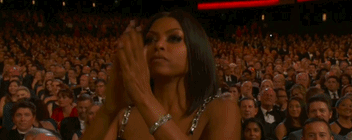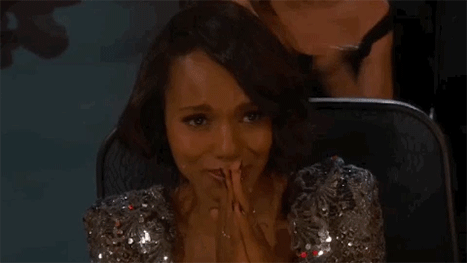

#Emmys2015
Black Sisterhood Was the Emmys’ Biggest Winner
The demonstration of love and support among Hollywood's women of color—e.g., Taraji P. Henson, Viola Davis, Uzo Aduba—was more extraordinary than any of the awards won.
This article was made possible because of the generous support of DAME members. We urgently need your help to keep publishing. Will you contribute just $5 a month to support our journalism?
The tears kept rolling like rivers down my face. I couldn’t stop crying. I didn’t want to stop crying. Her words were like a salve on my soul. An “I see you, Sis” from 3,000 miles away. I don’t know her. Not sure if I’ll ever meet her. But that brilliant, richly dark woman, with her glorious crown of natural hair, shined brighter than any star on my screen in that moment.
“In my mind, I see a line. And over that line, I see green fields and lovely flowers and beautiful white women with their arms stretched out to me over that line. But I can’t seem to get there no how. I can’t seem to get over that line …
That was Harriet Tubman in the 1800s. And let me tell you something: The only thing that separates women of color from anyone else is opportunity. You cannot win an Emmy for roles that are simply not there. So, here’s to all the writers, the awesome people that are Ben Sherwood, Paul Lee, Peter Nowalk, Shonda Rhimes. People who have redefined what it means to be beautiful, to be sexy, to be a leading woman, to be black. And to the Taraji P. Hensons and Kerry Washingtons, the Halle Berrys, the Nicole Beharies, the Meagan Goodes, to Gabrielle Union. Thank you for taking us over that line. Thank you for the Television Academy. Thank you.”
I recognize now that much more than Viola Davis’s words of truth and empowerment were rumbling in my heart as I watched the Emmy Awards on Sunday evening. It was a second vision that overwhelmed me. Another woman. Golden-brown skin. Full lips trembling with emotion. Her own tears flowing freely. And then another. This woman, only slightly browner than the second. Straight hair lightly grazing her collarbone. Clapping wildly and in unabashed celebration for yet another—a cocoa-colored woman called on to hold up the ever elusive golden statue. This beautifully wild one? Her yelps of joy sliced the pretentious air in a room full of her … their … alleged peers.
Now before your defenses rise, compelling you to unnecessarily declare that #allactressesmatter, allow me some leeway here. I say “alleged,” not as a slight to the other amazing talent in the room, but because, in that moment, these women rose high above the title of “actor” they have all claimed for themselves.
They were sisters.
Viola. Kerry. Uzo. Regina. Taraji.
Sisters.
Believe it or not, something even more wonderful than the Emmy wins of three amazing Black actresses occurred on Sunday night. Regina King, the Outstanding Supporting Actress in a Limited Series; Uzo Aduba, the Outstanding Supporting Actress in a Drama Series; and Viola Davis, the first African-American Outstanding Lead Actress in a Drama Series—women whose work are altogether different in method and style and technique—were openly and enthusiastically celebrated by other Black actresses, and Black women in the room and around the country. The unique sisterhood of Black women was on full display during the televised ceremony.
This is especially significant considering that Black women are regularly stereotyped as perpetually angry, hard to get along with, and—because as Davis mentioned, still too few opportunities exist in realms such as show business—are uber-jealous of one another’s success. This all-too-frequently spun narrative is as far from the truth as a Donald Trump speech.

Did you see Taraji jump almost out of her skin when Regina King won? Couldn’t you just feel the warmth and authenticity of her embrace of Viola Davis when the star of How to Get Away With Murder won—wait for it—in a category which Taraji herself was also nominated? Maybe you missed seeing Kerry’s face flood with tears while watching it all go down from the audience? And how about that #blackgirlmagic roll call in Davis’s speech?

But just in case one is tempted to relegate these responses to a mere phenomenon that only occurs in some assumed sociological safe pocket of Hollywood, let’s me disabuse you of that notion. Blogger and Girls advocate Tarana Burke touted the normality of Black girls and women supporting each other in a Facebook post responding to the wins: “This [kind of sisterhood] isn’t [an aspirational] goal for me. It’s reminiscent of every single sister I roll with. We love HARD and ride for each other every day, all day.”
I agree. In my own life, it’s most often been a Black woman who has stepped up to support me in any number of roles—from road dogs to spiritual guides, from confidantes to cheerleaders to conspirators. No, not every Black woman is supportive. Because: Human. But I’ve been challenged and checked, listened to and loved on by Black women of all ages at every critical moment of my life and yes, even in spite of my own sometimes reality TV-esque self.
Valid critiques and opinions aside (because we all have them), the M.O. of most sisters I know is this: No Black woman left behind. It’s not that some of what we see on reality TV isn’t true. It’s that it isn’t the only truth. It’s actually one very small chapter in a larger, more magnificent narrative. There are other stories to be told. Other models—like the ones we saw on Sunday—to behold. Black women are as nuanced and diverse as any other group. Dare I say, even more so—simply because of the experiential high bars we have to clear.
It’s not that deep, you say? Why so emotional, you ask?
In 2015, we are still kicking down doors to be the “first.” So, a win for one of us feels like a win for all of us. In a way, it was me on that stage with Viola. And my mother. And my daughter. Her win is ours.
Taraji knew that. That’s why she rejoiced. Kerry knew it, too. That’s why her tears flowed like rivers. Uzo knew it. That’s why her smile was as wide as the sea. They all understood what most Black women and girls watching felt deep down in our fiber. Those wins contained multitudes—of hope.
And maybe, just maybe, that’s the devastating part of all this. We’ve always known that, when given those opportunities, Black women would step into these roles and rock completely out. It’s not so much some terrible need for validation from the mainstream establishment at stake, although I suspect there’s some of that in the mix. It’s just that it is a complete and utter shame that we are still so shocked that we win anything at all. It’s a shame that nearly every single one of those sisters didn’t “expect” to win. I’m certain it wasn’t because they thought they didn’t deserve it. It’s likely because they were certain that others perceived they didn’t. That the system would most likely deem their work inferior. Just because.
The epitome of privilege—and one demonstrated by the hateful message tweeted by General Hospital actress Nancy Lee Grahn the very next day—is never having to question that the reason why you did or did not win an award was for reasons other than a true and accurate assessment of your talent. I would venture to say that every brown beauty that crossed that stage on Sunday has questioned that very thing.
Nevertheless, that lived experience is much easier to bear when your sister stands with you. When she tackles you with demonstrations of her love and respect. When she screams aloud her pride for all the world to hear. Across the distance of a score and four years, the words of another great Black woman artist, Lucille Clifton, meet up with Viola Davis’s declaration of “crossed lines”: “Won’t you celebrate with me?/What I have shaped into a kind of life?/I had no model/born in Babylon/both nonwhite and woman/what did i see to be except myself?/i made it up/here on this bridge between starshine and clay/my one hand holding tight my other hand/come celebrate with me/that everyday/something has tried to kill me/and has failed.”
I will, sisters. I will celebrate you all.
Before you go, we hope you’ll consider supporting DAME’s journalism.
Today, just tiny number of corporations and billionaire owners are in control the news we watch and read. That influence shapes our culture and our understanding of the world. But at DAME, we serve as a counterbalance by doing things differently. We’re reader funded, which means our only agenda is to serve our readers. No both sides, no false equivalencies, no billionaire interests. Just our mission to publish the information and reporting that help you navigate the most complex issues we face.
But to keep publishing, stay independent and paywall free for all, we urgently need more support. During our Spring Membership drive, we hope you’ll join the community helping to build a more equitable media landscape with a monthly membership of just $5.00 per month or one-time gift in any amount.
















































































